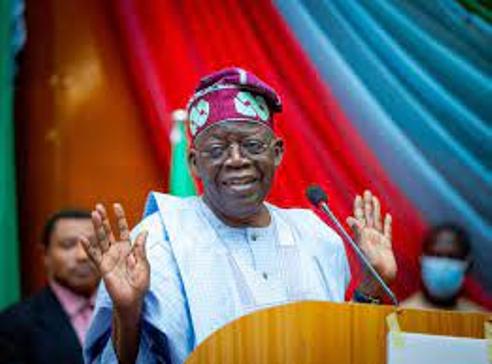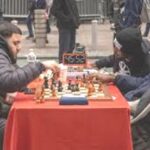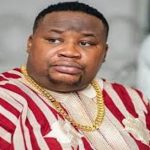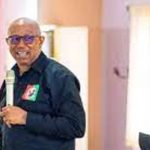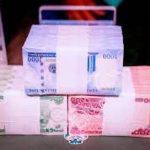Who Is Bola Ahmed Tinubu?
LAGOS JUNE 9TH (NEWSRANGERS)-Bola Tinubu, 70, widely credited with reshaping Nigeria’s commercial hub Lagos, will lead the ruling All Progressives Congress (APC) into next February’s presidential election but he faces a reinvigorated opposition, allegations of corruption, and health issues as he eyes one of Africa’s most daunting jobs.
Once forced into exile by military ruler Sani Abacha, Mr Tinubu knows the value of freedom and wears it as an insignia on his signature hat – a broken shackle that looks like a horizontal figure eight.
A trained accountant, it was the activities of the pro-democracy National Democratic Coalition (Nadeco) group, where he was a member, that brought him into Abacha’s crosshairs.
The opposition of groups like Nadeco and Abacha’s death in 1998 ushered in Nigeria’s democracy in 1999 and in many ways, Mr Tinubu, a former Mobil oil executive, feels entitled to Nigeria’s presidency.
He will be banking on his experience in politics and huge influence across the country to win the election, where he will face stiff competition from former Vice-President Atiku Abubakar, who is standing for the main opposition Peoples Democratic Party (PDP), and a burgeoning campaign by the Labour Party’s Peter Obi, who is hugely popular with urban voters.
If Mr Tinubu, known as Jagaban by supporters, gets the top job, he would be looking to unify a country divided across regional lines, tackle widespread insecurity, create jobs and bring down rising inflation.
But it is not a job that fazes him. He has pointed to his time as Lagos state governor between 1999 and 2007 to sell his candidacy to party delegates and will be hoping to do the same with Nigerians.
Under his tenure, Lagos massively grew its income through huge foreign investment, while a public transport scheme that saw new lanes created for rapid buses eased the notorious traffic jams faced daily by commuters.
Despite its enormous wealth, Lagos has not been able to solve its notorious traffic jams by completing a light rail project started by Mr Tinubu
But the city of around 25 million people has not lived up to its reputation as a megacity despite his claims of turning it around.
Public infrastructure is largely in a state of disrepair- basic amenities such as water and public housing are decrepit, while a light rail project started during his reign has not been completed almost 20 years later despite the riches of the state.
He has also been accused of keeping a grip on state finances despite leaving office in 2007.
Every governor that has succeeded him has been a protégé following a “grand roadmap”, while one that dared to find his own path was quickly brought to heel, aided by powerful transport union members.
There are also allegations of corruption against Mr Tinubu, which he denies.
Two years ago, Dapo Apara, an accountant at Alpha-beta, a firm where Mr Tinubu purportedly holds stakes through a crony, accused him of using the firm for money laundering, fraud, tax evasion, and other corrupt practices.
Mr Tinubu was sued despite he and Alpha-beta denying the allegations but all parties decided to settle out of court in January.
Such allegations, including twice facing Nigeria’s Code of Conduct Tribunal (CCT), on allegations of breaching the code of public officers – where he was cleared – make opponents say Mr Tinubu is not the right man for the job in a country where corruption is high.
In the last election, a brazen display of an armoured van used by banks to move money driving into his palatial compound in the Ikoyi area of Lagos fuelled suspicions that he was involved in vote-buying, which he made no great effort to deny.
“If I have money, if I like, I give it to the people free of charge, as long as [it’s] not to buy votes,” he said.
Many people have also not forgotten his comments after the deaths of #EndSars protesters in the Lekki part of Lagos in 2020, when he questioned the intentions of young protesters who died.
He is seen as the political godfather of the south-west region and its most influential figure, who decides how power is distributed among his many acolytes.
In 2015 he described describes himself as a “talent hunter” that puts “talents into office”.
Mr Tinubu (left) claims to have helped both Vice-President Yemi Osinbajo (centre) and President Buhari (right) into office
His immense political influence led to the merger of opposition parties in 2013 and eventually wrestled power from the then ruling PDP in 2015 – a rarity in Nigeria where incumbents are rarely defeated.
Last week, when it looked as though Mr Tinubu’s aspirations were flagging, he reminded Nigerians that he was largely responsible for installing President Muhammadu Buhari after the former military ruler had failed on several occasions to win the presidency.
Mr Buhari’s associates have since tried to downplay the former governor’s influence in the 2015 election, but it is unlikely that the current president would have emerged, twice, without the backing of Mr Tinubu.
Mr Tinubu is widely touted to have also nominated the current Vice-President, Yemi Osinbajo to his role and had a hand in the emergence of Nigeria’s Senate President Ahmed Lawan and the Speaker of the House of Representatives, Femi Gbajabiamila.
That is why his supporters saw it as a betrayal when the vice-president, who worked with Mr Tinubu as a commissioner in Lagos, ran against his former boss for the APC ticket.
Now that all that is behind him, Mr Tinubu is expected to embark on an intense campaign across Nigeria canvassing for votes where many will keep a keen eye on his health and physical appearance.
Last year, he spent three months in London for a knee injury and there are other concerns about an undisclosed ailment.
Nigerians may be wary of another president with health issues after President Umaru Yar’Adua died in office in 2010 and a current president who has spent considerable time getting medical treatment abroad.
Mr Tinubu also faces the tricky task of choosing a running mate and navigating Nigeria’s complicated religious and ethnic permutations.
Power is usually rotated between the north and the south, which are respectively dominated by Muslims and Christians.
Mr Tinubu, a southern Muslim, has to decide if he will seek a Christian politician from the north – a limited pool – and risk losing votes in the region, or settle for another Muslim, possibly alienating southern Christian votes.
This conundrum has not been made easier by the main opposition PDP which has Mr Abubakar, a Muslim from the north and is expected to pick a Christian vice from the south.
But whoever wins February’s election, in what is likely to be tightly contested, will have to tackle many issues left behind by Mr Buhari – widespread insecurity, high unemployment, rising inflation and a country divided along ethnic lines.
It is not an impossible job, but the task ahead is daunting.
BBC NEWS
Short URL: https://newsrangers.com/?p=89018


